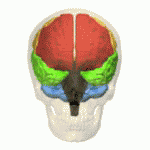Lobes of the brain
(Redirected from Brain lobes)
==Lobes of the Brain ==
The lobes of the brain are distinct regions of the cerebral cortex that are responsible for different functions. The brain is divided into four main lobes: the frontal lobe, parietal lobe, temporal lobe, and occipital lobe. Each lobe has specific roles and is associated with different aspects of cognition, behavior, and sensory processing.
Frontal Lobe[edit | edit source]
The frontal lobe is located at the front of the brain and is involved in a variety of complex functions including decision making, problem solving, control of purposeful behaviors, consciousness, and emotions. It contains the primary motor cortex, which is crucial for voluntary movement.
Parietal Lobe[edit | edit source]
The parietal lobe is situated behind the frontal lobe and above the temporal lobe. It plays a key role in processing sensory information from various parts of the body, understanding spatial orientation, and managing language and mathematics.
Temporal Lobe[edit | edit source]
The temporal lobe is located beneath the parietal lobe and is primarily involved in processing auditory information and is also important for the processing of memory and emotion. It contains the primary auditory cortex and areas critical for language comprehension.
Occipital Lobe[edit | edit source]
The occipital lobe is found at the back of the brain and is mainly responsible for visual processing. It contains the primary visual cortex, which receives and interprets information from the retina.
Additional Lobes[edit | edit source]
In addition to the four main lobes, some sources also recognize the limbic lobe and the insula as distinct regions. The limbic lobe is involved in emotion, behavior, and long-term memory, while the insula is associated with consciousness and homeostasis.
Functions and Interactions[edit | edit source]
The lobes of the brain do not function in isolation; they interact with each other through complex networks of neurons. This interaction is essential for integrating different types of information and for the overall functioning of the brain.
Clinical Significance[edit | edit source]
Damage to any of the lobes can result in specific deficits. For example, damage to the frontal lobe can affect personality and decision making, while damage to the occipital lobe can result in visual impairments. Understanding the functions of each lobe is crucial for diagnosing and treating neurological disorders.
See Also[edit | edit source]
| Neuroanatomy | ||||||||||
|---|---|---|---|---|---|---|---|---|---|---|
This neuroanatomy-related article is a stub.
|
Search WikiMD
Ad.Tired of being Overweight? Try W8MD's NYC physician weight loss.
Semaglutide (Ozempic / Wegovy and Tirzepatide (Mounjaro / Zepbound) available. Call 718 946 5500.
Advertise on WikiMD
|
WikiMD's Wellness Encyclopedia |
| Let Food Be Thy Medicine Medicine Thy Food - Hippocrates |
Translate this page: - East Asian
中文,
日本,
한국어,
South Asian
हिन्दी,
தமிழ்,
తెలుగు,
Urdu,
ಕನ್ನಡ,
Southeast Asian
Indonesian,
Vietnamese,
Thai,
မြန်မာဘာသာ,
বাংলা
European
español,
Deutsch,
français,
Greek,
português do Brasil,
polski,
română,
русский,
Nederlands,
norsk,
svenska,
suomi,
Italian
Middle Eastern & African
عربى,
Turkish,
Persian,
Hebrew,
Afrikaans,
isiZulu,
Kiswahili,
Other
Bulgarian,
Hungarian,
Czech,
Swedish,
മലയാളം,
मराठी,
ਪੰਜਾਬੀ,
ગુજરાતી,
Portuguese,
Ukrainian
Medical Disclaimer: WikiMD is not a substitute for professional medical advice. The information on WikiMD is provided as an information resource only, may be incorrect, outdated or misleading, and is not to be used or relied on for any diagnostic or treatment purposes. Please consult your health care provider before making any healthcare decisions or for guidance about a specific medical condition. WikiMD expressly disclaims responsibility, and shall have no liability, for any damages, loss, injury, or liability whatsoever suffered as a result of your reliance on the information contained in this site. By visiting this site you agree to the foregoing terms and conditions, which may from time to time be changed or supplemented by WikiMD. If you do not agree to the foregoing terms and conditions, you should not enter or use this site. See full disclaimer.
Credits:Most images are courtesy of Wikimedia commons, and templates, categories Wikipedia, licensed under CC BY SA or similar.
Contributors: Prab R. Tumpati, MD





